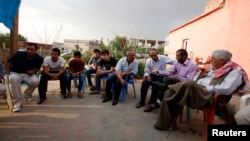The leadership of the Kurdish rebel group PKK has called on Ankara to "declare its stance on ISIL."
The PKK is accusing the Turkish government of backing ISIL in its battle against Syrian Kurds. Ankara has blamed the PKK for the deaths of three soldiers this week in a clash on the Syrian border. Concerns are now growing that the deepening tensions concerning the future of the Syrian Kurds could jeopardize peace efforts between the PKK and Ankara.
In a statement issued by the leadership of the Kurdish rebel group the PKK, it warned the Turkish government its support of the radical Islamic group ISIL was incompatible with ongoing peace efforts.
The PKK claimed Ankara is providing logistical and medical support for ISIL in its battle against Syrian Kurds who declared an autonomous secular region called Rojava. International relations expert Cengiz Aktar of the Istanbul Policy Centre said, despite denials by Ankara, there is strong evidence of at least tacit support of ISIL.
"Turkey used ISIL and other groups to push its policy regarding Syrian Kurds and it employed ISIL, al-Nusra and al-Qaida offshoots for months if not years as subcontracting fighters," Ankara stated. "Turkey’s western partners were warning Turkey against this dangerous collaboration with radical Islamists."
Ankara accuses the leadership of the Syrian Kurdish enclave, which borders Turkey’s own predominantly Kurdish region, as being under PKK control, a charge it denies. Observers say there are strong family and tribal ties between the two Kurdish minorities of Syria and Turkey. Many members of the PKK are Syrian Kurds.
Political columnist Asli Aydintasbas of the Turkish newspaper Milliyet says there is considerable support among many of Turkey’s Kurds for the plight of their Syrian kin.
"They are trying to develop local governance there and meanwhile fighting Jihadist and actually Turkish citizens of Kurdish origin from Turkey are crossing the border and going into the Syrian Kurdish territory to fight ISIL there," said Aydintasbas.
According to local media reports, this month nearly 1,000 Kurds from Turkey entered Syria to fight ISIL. Experts say the surge in numbers follows ISIL's launch of a major offensive against the Syrian Kurds, using heavy weapons secured from recent victories against the Iraqi army. Ankara's efforts to beef up its military presence along the Syrian-Kurdish border has only increased tensions and drawn further criticism from both the PKK and pro-Kurdish parties in Turkey.
Earlier this week three Turkish soldiers and six suspected PKK members were killed in a clash on the Syrian border. Despite the rising tension, analyst Sinan Ulgen, a visiting scholar for the Carnegie Europe institute in Brussels, said the current peace process between Ankara and the PKK will continue for now.
"The peace process in Turkey has its own dynamic, it will not be derailed by what is going on beyond Turkey, that is essentially the two sides are firmly committed to this process, both the Kurdish side but also the Turkish government. And they certainly would not want this process to collapse for factors beyond their control," stated Ulgen.
The peace process between Ankara and the PKK seeks to end a 3-decade-long conflict for greater Kurdish rights.
Although the process remains stalled, the government has promised progress will be made after next month’s presidential elections.
Observers warn patience running out among pro-Kurdish activists, and that a key test of the government’s sincerity is not only over the steps its takes in Turkey but also in neighboring Syria.




